

East of the Sun and West of the Moon. Twine / An open-source tool for telling interactive, nonlinear stories. All Watched Over By Machines Of Loving Grace by Richard Brautigan - Famous poems, famous poets. - All Poetry. The Misadventures of Zander. I have drawn a lot of my inspiration from Christopher Livingston, and his two blogs, “Living in Oblivion” and “The Elder Strolls”.

Both pieces are a major influence and inspirations for my blog. I have also drawn inspiration from others who have also taken up the mantle of a wandering NPC. Also, I found inspiration from writers who have written and are writing some very good Elder Scrolls Fan-Fictions. Below you will find a short list of writers and/or blogs I feel have directly influenced me and “The Misadventures of Zander”. Living in Oblivion: The Blog that started it all. Free Poems: Pieces - By Daria Renata Jaworska. Pieces Very infective weather came here today.
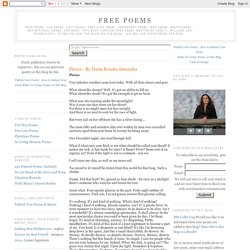
Kakekotoba: Introduction to Konjaku Monogatarishū (今昔物語集) I've decided to mix in some translation/analysis posts on another work that I've had (brief) exposure to: Konjaku Monogatarishū (今昔物語集), or Compilation of Stories from the Past, a collection of Buddhist and secular tales written and collated towards the end of the Heian period (794-1185).

Other than my prior exposure to it, one reason why I selected Konjaku is because, in many ways, it can be contrasted with Shunshoku Umegoyomi. The latter was written in the late Edo period, while the policy of sakoku was still in effect. It can thus be seen primarily as the product of an introverted Japan, one that shunned external influence. Taxonomy of the 37 basic silent-film plots / Boing Boing. It's a lovely piece of narrative theory from Wycliff Aber Hill's 1919 book Ten Million Photoplay Plots: The Master Key to All Dramatic Plots, part of a tradition of stage-play manuals that presented related taxonomies for aspiring writers.
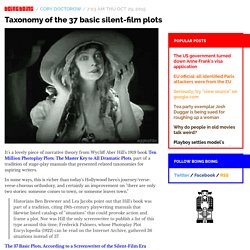
In some ways, this is richer than today's Hollywood hero's journey/verse-verse-chorous orthodoxy, and certainly an improvement on "there are only two stories: someone comes to town, or someone leaves town. " Picture-Poems By Kenneth Patchen. Now is then's only tomorrow/ As ever the trust of little birds/ That the sky will be/ Smart enough to appreciate/ Their invention of flying Ah, yes!
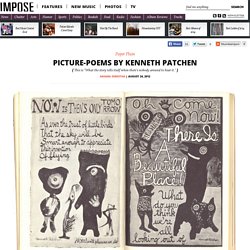
We'll please as we do" "Oh come now! “Don’t Read Books!” A 12th-Century Zen Poem. By Maria Popova “It’s annoying for others to have to hear you.”

We live in a culture that often romanticizes books as the tender and exhilarating love-making to the “orgasm without release” of Alan Watts’s admonition against our media gluttony — an antidote to the frantic multitasking of modern media, refuge from the alleged evils of technology, an invitation for slow, reflective thinking in a fast-paced age obsessed with productivity. Books, Kafka memorably asserted, are “the axe for the frozen sea inside us.” Given I spend the majority of my waking hours reading and writing about books, I have certainly bought into that romantic notion.
George Orwell’s Letter On Why He Wrote ‘1984’ To Noel Willmett 18 May 1944 10a Mortimer Crescent NW 6 Many thanks for your letter.

You ask whether totalitarianism, leader-worship etc. are really on the up-grade and instance the fact that they are not apparently growing in this country and the USA. I must say I believe, or fear, that taking the world as a whole these things are on the increase. Kubla Khan. Title page of Kubla Khan (1816) Kubla Khan /ˌkʊblə ˈkɑːn/ is a poem written by Samuel Taylor Coleridge, completed in 1797 and published in 1816.
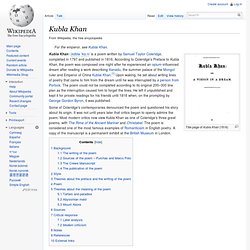
According to Coleridge's Preface to Kubla Khan, the poem was composed one night after he experienced an opium-influenced dream after reading a work describing Xanadu, the summer palace of the Mongol ruler and Emperor of China Kublai Khan.[1] Upon waking, he set about writing lines of poetry that came to him from the dream until he was interrupted by a person from Porlock. The poem could not be completed according to its original 200–300 line plan as the interruption caused him to forget the lines.
He left it unpublished and kept it for private readings for his friends until 1816 when, on the prompting by George Gordon Byron, it was published. Background[edit] The writing of the poem[edit] Coleridge, 1814 Sources of the poem – Purchas and Marco Polo[edit] The Crewe Manuscript[edit] Latin Phrases: searchable database of popular Latin sayings and quotes. This searchable database of Latin phrases is based on a comprehensive list of Latin quotes and phrases.
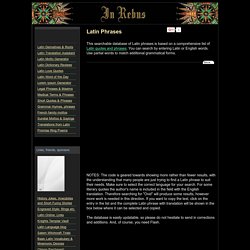
You can search by entering Latin or English words. Use partial words to match additional grammatical forms. NOTES: The code is geared towards showing more rather than fewer results, with the understanding that many people are just trying to find a Latin phrase to suit their needs. Make sure to select the correct language for your search. For some literary quotes the author's name is included in the field with the English translation. The database is easily updatable, so please do not hesitate to send in corrections and additions. Will our popular culture survive into the future? 1984 v. Brave New World. In October of 1949, a few months after the release of George Orwell's dystopian masterpiece, Nineteen Eighty-Four, he received a fascinating letter from fellow author Aldous Huxley — a man who, 17 years previous, had seen his own nightmarish vision of society published, in the form of Brave New World.
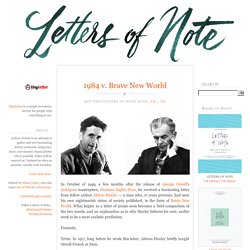
What begins as a letter of praise soon becomes a brief comparison of the two novels, and an explanation as to why Huxley believes his own, earlier work to be a more realistic prediction. Fantastic. Trivia: In 1917, long before he wrote this letter, Aldous Huxley briefly taught Orwell French at Eton. (Source: Letters of Aldous Huxley; Image: George Orwell (via) & Aldous Huxley (via).) Read Aldous Huxley's review of 1984 he sent to George Orwell. From A to B and Through to Z: Brilliant, grotesque illustrated alphabet.
Philip Harris's beautiful illustrated alphabet, From A to B and through to Z is a grotesque wonder of animals acting out different trades, and each drawing is more fabulous than the last. Mr Harris has graciously provided us with five of these, at a high enough resolution that you can really see the awesomeness: D is for Docks M is for Market P is for Performance U is for Underground W is for Worship Philip Harris Comic "From A to B and through to Z" 549. Rime of the Ancient Mariner. Samuel Taylor Coleridge. The Oxford Book of English Verse. The Best Books of Poetry For Every Kind of Science Fiction Fan.